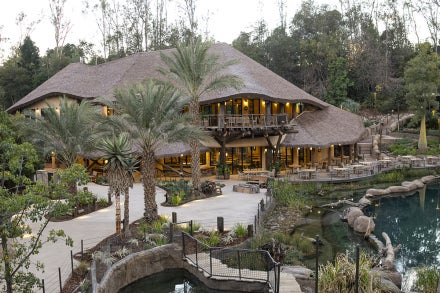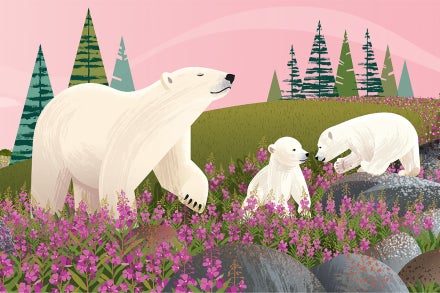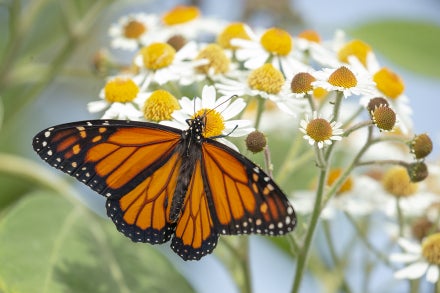Image

Zoo InternQuest is a seven-week career exploration program for San Diego County high school juniors and seniors. Students have the unique opportunity to meet professionals working for the San Diego Zoo, Safari Park, and Institute for Conservation Research, learn about their jobs and then blog about their experience online. Follow their adventures here on the Zoo’s Website!
 Every birth at the San Diego Zoo is crucial to conservation around the world. So when an animal is unable to take care of its baby, a team of 5 NACU (neonatal assisted care unit) keepers steps in. Becky Kier, Senior NACU Keeper, explained what it meant to help lead the fight against extinction by raising mammals that needed assistance.
After quick introductions, interns had the opportunity to see the feeding of a baby bontebok, a species of antelope native to Africa. The bontebok was born with some health complications, so veterinarians made the decision to temporarily separate the baby from the rest of the herd. This action will allow the bontebok to receive the necessary care he would not be able to thrive without.
Ms. Kier mentioned some of the other types of animals they have helped raise in the past, such as a wallaby that only had a small chance of survival. Thanks to the amazing work from the NACU, the wallaby is doing very well today and even has a baby of her own. Another example would be a trio of fossas. One fossa, named Isa, was raised to be an animal ambassador. Isa demonstrates how vital it is to be hand-raised from birth to be able to handle various scenarios, such as a noisy crowd or a walk around the Zoo. Animal ambassadors aid in educating the public about some of the issues that species are facing in the wild. By being able to connect better with animal ambassadors, people are more willing to help make a change to directly help that species in its natural habitat. This form of teaching helps with the conservation of species from around the world.
In addition to raising animal ambassadors, the NACU aids in the global conservation efforts by sharing information. When a baby is being raised through the NACU, thorough notes are taken on the specifics of raising that animal so that they can be shared with other zoos around the world. One of the coolest projects the NACU has been a part of was assisting China with their giant pandas by giving them the necessary information to help hand-rear cubs when necessary. Traditionally, female giant pandas will give birth to two cubs, but unfortunately, giant pandas typically only have enough resources to care for one baby. That being said, zoos in China have tried to increase the giant panda’s population by caring for the second baby that otherwise would not survive. Ms. Kier and a few other NACU keepers traveled to China to help share some of their knowledge of how they care for giant panda cubs at the San Diego Zoo. Thanks to a global effort, the survival rate of nursery-reared giant panda cubs in China has leaped from 0 to 95 percent.
The NACU is helping endangered animals one newborn at a time. From aiding in the education of the next generation to sharing detailed information regarding the rearing of an animal species, the NACU plays a very important role in worldwide conservation efforts.
Kylie, Conservation Team
Week Two, Fall 2015
Every birth at the San Diego Zoo is crucial to conservation around the world. So when an animal is unable to take care of its baby, a team of 5 NACU (neonatal assisted care unit) keepers steps in. Becky Kier, Senior NACU Keeper, explained what it meant to help lead the fight against extinction by raising mammals that needed assistance.
After quick introductions, interns had the opportunity to see the feeding of a baby bontebok, a species of antelope native to Africa. The bontebok was born with some health complications, so veterinarians made the decision to temporarily separate the baby from the rest of the herd. This action will allow the bontebok to receive the necessary care he would not be able to thrive without.
Ms. Kier mentioned some of the other types of animals they have helped raise in the past, such as a wallaby that only had a small chance of survival. Thanks to the amazing work from the NACU, the wallaby is doing very well today and even has a baby of her own. Another example would be a trio of fossas. One fossa, named Isa, was raised to be an animal ambassador. Isa demonstrates how vital it is to be hand-raised from birth to be able to handle various scenarios, such as a noisy crowd or a walk around the Zoo. Animal ambassadors aid in educating the public about some of the issues that species are facing in the wild. By being able to connect better with animal ambassadors, people are more willing to help make a change to directly help that species in its natural habitat. This form of teaching helps with the conservation of species from around the world.
In addition to raising animal ambassadors, the NACU aids in the global conservation efforts by sharing information. When a baby is being raised through the NACU, thorough notes are taken on the specifics of raising that animal so that they can be shared with other zoos around the world. One of the coolest projects the NACU has been a part of was assisting China with their giant pandas by giving them the necessary information to help hand-rear cubs when necessary. Traditionally, female giant pandas will give birth to two cubs, but unfortunately, giant pandas typically only have enough resources to care for one baby. That being said, zoos in China have tried to increase the giant panda’s population by caring for the second baby that otherwise would not survive. Ms. Kier and a few other NACU keepers traveled to China to help share some of their knowledge of how they care for giant panda cubs at the San Diego Zoo. Thanks to a global effort, the survival rate of nursery-reared giant panda cubs in China has leaped from 0 to 95 percent.
The NACU is helping endangered animals one newborn at a time. From aiding in the education of the next generation to sharing detailed information regarding the rearing of an animal species, the NACU plays a very important role in worldwide conservation efforts.
Kylie, Conservation Team
Week Two, Fall 2015
 Every birth at the San Diego Zoo is crucial to conservation around the world. So when an animal is unable to take care of its baby, a team of 5 NACU (neonatal assisted care unit) keepers steps in. Becky Kier, Senior NACU Keeper, explained what it meant to help lead the fight against extinction by raising mammals that needed assistance.
After quick introductions, interns had the opportunity to see the feeding of a baby bontebok, a species of antelope native to Africa. The bontebok was born with some health complications, so veterinarians made the decision to temporarily separate the baby from the rest of the herd. This action will allow the bontebok to receive the necessary care he would not be able to thrive without.
Ms. Kier mentioned some of the other types of animals they have helped raise in the past, such as a wallaby that only had a small chance of survival. Thanks to the amazing work from the NACU, the wallaby is doing very well today and even has a baby of her own. Another example would be a trio of fossas. One fossa, named Isa, was raised to be an animal ambassador. Isa demonstrates how vital it is to be hand-raised from birth to be able to handle various scenarios, such as a noisy crowd or a walk around the Zoo. Animal ambassadors aid in educating the public about some of the issues that species are facing in the wild. By being able to connect better with animal ambassadors, people are more willing to help make a change to directly help that species in its natural habitat. This form of teaching helps with the conservation of species from around the world.
In addition to raising animal ambassadors, the NACU aids in the global conservation efforts by sharing information. When a baby is being raised through the NACU, thorough notes are taken on the specifics of raising that animal so that they can be shared with other zoos around the world. One of the coolest projects the NACU has been a part of was assisting China with their giant pandas by giving them the necessary information to help hand-rear cubs when necessary. Traditionally, female giant pandas will give birth to two cubs, but unfortunately, giant pandas typically only have enough resources to care for one baby. That being said, zoos in China have tried to increase the giant panda’s population by caring for the second baby that otherwise would not survive. Ms. Kier and a few other NACU keepers traveled to China to help share some of their knowledge of how they care for giant panda cubs at the San Diego Zoo. Thanks to a global effort, the survival rate of nursery-reared giant panda cubs in China has leaped from 0 to 95 percent.
The NACU is helping endangered animals one newborn at a time. From aiding in the education of the next generation to sharing detailed information regarding the rearing of an animal species, the NACU plays a very important role in worldwide conservation efforts.
Kylie, Conservation Team
Week Two, Fall 2015
Every birth at the San Diego Zoo is crucial to conservation around the world. So when an animal is unable to take care of its baby, a team of 5 NACU (neonatal assisted care unit) keepers steps in. Becky Kier, Senior NACU Keeper, explained what it meant to help lead the fight against extinction by raising mammals that needed assistance.
After quick introductions, interns had the opportunity to see the feeding of a baby bontebok, a species of antelope native to Africa. The bontebok was born with some health complications, so veterinarians made the decision to temporarily separate the baby from the rest of the herd. This action will allow the bontebok to receive the necessary care he would not be able to thrive without.
Ms. Kier mentioned some of the other types of animals they have helped raise in the past, such as a wallaby that only had a small chance of survival. Thanks to the amazing work from the NACU, the wallaby is doing very well today and even has a baby of her own. Another example would be a trio of fossas. One fossa, named Isa, was raised to be an animal ambassador. Isa demonstrates how vital it is to be hand-raised from birth to be able to handle various scenarios, such as a noisy crowd or a walk around the Zoo. Animal ambassadors aid in educating the public about some of the issues that species are facing in the wild. By being able to connect better with animal ambassadors, people are more willing to help make a change to directly help that species in its natural habitat. This form of teaching helps with the conservation of species from around the world.
In addition to raising animal ambassadors, the NACU aids in the global conservation efforts by sharing information. When a baby is being raised through the NACU, thorough notes are taken on the specifics of raising that animal so that they can be shared with other zoos around the world. One of the coolest projects the NACU has been a part of was assisting China with their giant pandas by giving them the necessary information to help hand-rear cubs when necessary. Traditionally, female giant pandas will give birth to two cubs, but unfortunately, giant pandas typically only have enough resources to care for one baby. That being said, zoos in China have tried to increase the giant panda’s population by caring for the second baby that otherwise would not survive. Ms. Kier and a few other NACU keepers traveled to China to help share some of their knowledge of how they care for giant panda cubs at the San Diego Zoo. Thanks to a global effort, the survival rate of nursery-reared giant panda cubs in China has leaped from 0 to 95 percent.
The NACU is helping endangered animals one newborn at a time. From aiding in the education of the next generation to sharing detailed information regarding the rearing of an animal species, the NACU plays a very important role in worldwide conservation efforts.
Kylie, Conservation Team
Week Two, Fall 2015



